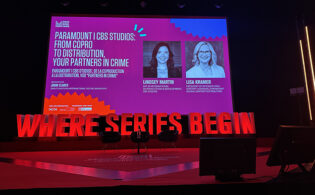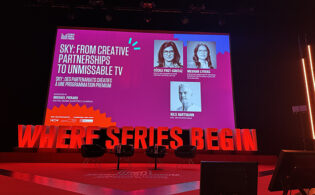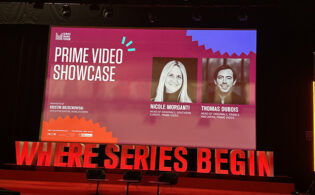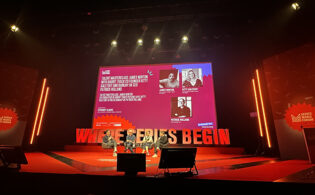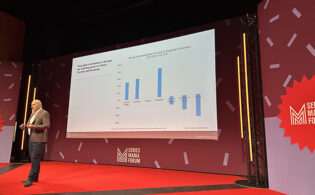As part of Series Mania Forum’s Lille Dialogues strand, Ruth Berry, president of global partnerships and Zoo 55 at ITV Studios, took part in a fireside chat to discuss the “bittersweet” situation of creative strengths versus market headwinds as well as budgets for scripted, business in the U.S. and sharing rights with streamers.
On the state of the scripted market, Berry said: “2024 probably threw a few more curveballs than people were expecting. We’re very fortunate to have a really broad and deep catalog, particularly on the drama side. We had the most incredibly creative successful year last year in drama,” she said, referencing Fool Me Once, Ludwig and Mr Bates vs The Post Office. “There is still a lot of success in drama. And there is still a really important audience for good storytelling. There is still a rude health in that market.
“What we saw last year, though, was a perfect storm of some challenges, macroeconomic ones that were causing people to think about what they’re programming, who their key audience is now, which key advertisers they need to attract in their commercial broadcast business,” she continued. “And when that happens, you do have to look at your content strategy and say, OK, how much do I need to be making? How much should I be buying, and what is it that I actually need? Streamers were looking to become more profitable. Commercial broadcasters were grappling with advertising concerns. There were lots of things happening at once, which meant that people had to take a stop around what they were doing. It felt bittersweet last year when we had so much creative success, yet the headwinds were a bit stronger. The state of the market is an interesting one. This year—and I’m an optimist—feels like there’s more buoyancy in the market.”
Berry also touched on budgets, saying it is difficult to peg a specific number to what’s expected nowadays. “We want to work with the best drama, we want to have the best creatives. Cold Water is a really good example of us working with third parties, like Sister Pictures, and that’s a really key part of our portfolio. What It Feels Like for a Girl is another third-party show. It’s the portfolio that’s really important. That means we get the opportunity to think about how we balance the finances across that portfolio. People often ask, Is there a sweet spot? Is there a norm? My answer is that there’s never been a norm; if only there were! We’ve always prided ourselves on trying to be creative-led as well, because we are believers that the best stories will travel and will sell.”
She made a point that there is not necessarily a direct correlation between the cost of a show and its performance locally or internationally as well. “Because of our portfolio of shows and that breadth, we are able to take bigger bets and bigger swings where we want to and need to,” Berry said. “We also are a business that suffers from FOMO, so we never like to say no to things. We look at what the appetite is internationally, what our clients are telling us that they really need in their schedules and what’s coming through development. One of the toughest challenges for drama is the time lag. Because content requires financing and being greenlit, often, up to two years before we actually then take it into the market wholeheartedly. That lag is what’s been really hard the last few years, which is why people are migrating to a safer sweet spot. That feels like it’s in a comfort zone and manages the risk. Part of our job is to second-guess what the market is going to be like when we’re selling it in one to two years’ time. That’s where co-production has become important, because you’re trying to mitigate the risk of bringing financing in early.”
On the recalibration of working with the U.S. market, Berry noted the cyclical nature of the business. “The U.S. certainly was part and parcel of that reset and rethink last year around what content they need,” she said. “The U.S. market has been really quite tortuous over the last year or so, if you think about the rise of streaming and limitations now around broadcast, what’s happening with cable. But the appetite for great content is still there. We still have a lot of conversations in the U.S. and have success with co-production.”
For ITV Studios, the U.S. has proven a good opportunity for its catalog, Berry noted. “With 95,000 hours of programming, we’ve got a lot of broad, deep partnerships in the States around that. Again, as an optimist, we are seeing people now having made those decisions around content strategy, how much they’re making versus how much they’re acquiring, and it feels more positive around them looking to acquire British and European international content.”
Berry also touched on streamers’ flexibility at the moment with regard to rights. “There are still no norms. You have heard many people talk around the subject of windowing and slicing and dicing rights and trying to find different windows in different markets on different platforms in different ways. We’re trying to encourage the streamers to think in that way too. Some are more open-minded than others at the moment. We’ve done some great deals with Amazon’s Prime Video, where they’ve taken the U.K. and we’ve taken the rest of the world.”
She added that as content strategies were reevaluated last year, there have been new assessments on wants vs. needs. “Economically, wants and needs can be different,” said Berry. “So, what do I really want, but actually what do I need? There is upside in partnering around those rights, and if streamers are commissioning local for local but actually, they don’t necessarily think they’ll get a big return internationally long-term for those rights, then why not partner with distributors that can start to take those shows onto different platforms, raise their profile and share windows between linear and streaming and beyond. I’d like to think that the conversation becomes a more fruitful one in time. At the moment, it is a mixed economy. Some streamers are easier to work with for rights than others.”
